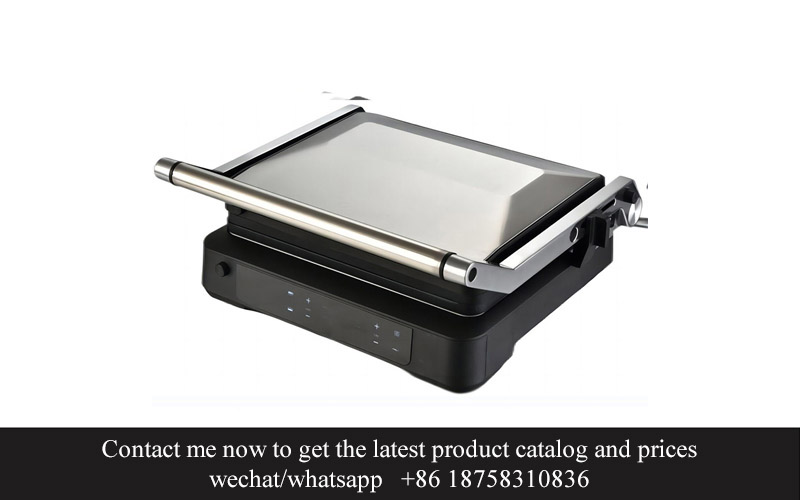Address
304 North Cardinal
St. Dorchester Center, MA 02124
Work Hours
Monday to Friday: 7AM - 7PM
Weekend: 10AM - 5PM
Address
304 North Cardinal
St. Dorchester Center, MA 02124
Work Hours
Monday to Friday: 7AM - 7PM
Weekend: 10AM - 5PM

In a world where kitchen appliances have become an integral part of daily life, the quest for quality, innovation, and ethical manufacturing has never been more crucial. As consumers demand more from their kitchenware, we delve into the evolving landscape of this industry, exploring the latest trends, the impact of certifications like BSCI, and the stories behind the success of factories that adhere to these high standards.
The kitchen, once a mere backdrop for cooking, has transformed into a hub of innovation and style in Europe and North America. With the rise of culinary culture and the increasing importance of home life, kitchenware has seen a remarkable surge in popularity. Here’s a closer look at how kitchenware has become a staple in these regions.
In Europe, the emphasis on culinary traditions and the appreciation for fine dining have fueled the demand for high-quality kitchenware. From the bustling streets of Paris to the cozy cottages in the English countryside, the kitchen has become a place where passion for cooking meets the latest technological advancements. From traditional cast iron skillets to sleek, modern induction cooktops, European kitchens are a testament to the evolution of kitchenware.
Similarly, in North America, the kitchen has evolved from a place of necessity to a space for culinary exploration and entertainment. The rise of cooking shows, food blogs, and social media has sparked a new wave of home cooks who are eager to experiment with recipes and cooking techniques. This has led to a surge in demand for kitchen gadgets, professional-grade appliances, and unique cooking tools that cater to both beginners and seasoned chefs.
One of the key factors driving the growth of the kitchenware market in both regions is the increasing focus on health and wellness. Consumers are not only looking for appliances that make cooking easier but also for those that promote healthier cooking methods. This shift has led to a greater interest in non-stick cookware, air fryers, and slow cookers, which are designed to reduce the need for excessive oil and fat.
The kitchenware industry in Europe and North America is also being shaped by the trend towards sustainability and eco-friendly products. Consumers are becoming more conscious of the environmental impact of their purchases, and as a result, there is a growing market for kitchenware made from recycled materials or sustainable sources. Companies that can offer eco-friendly alternatives are gaining a competitive edge in this increasingly eco-conscious market.
Innovation is another driving force behind the rise of kitchenware. Brands are constantly pushing the boundaries with new designs, features, and functionalities. Smart kitchen appliances that can connect to smartphones and provide cooking instructions, recipes, and even nutritional information are becoming more common. These innovations not only make cooking more convenient but also more enjoyable and interactive.
The rise of online shopping has also played a significant role in the growth of the kitchenware market. With the convenience of shopping from the comfort of one’s home, consumers have access to a wider variety of products than ever before. Online marketplaces have become a go-to destination for those looking for unique, hard-to-find kitchen items, as well as for the latest trends in kitchenware.
Despite the growth, the kitchenware market in Europe and North America faces challenges. One of the biggest is the need for brands to differentiate themselves in a crowded marketplace. Consumers are bombarded with options, and it can be difficult to stand out. Brands that focus on quality, innovation, and a strong brand identity are more likely to succeed.
Moreover, the market is subject to changing consumer preferences. Trends come and go, and what is popular today may not be tomorrow. Brands must be agile and responsive to these changes, continuously evolving their product lines to meet the needs and desires of their customers.
In conclusion, the rise of kitchenware in Europe and North America is a testament to the changing role of the kitchen in modern society. As cooking becomes more of a lifestyle choice and a source of enjoyment, the demand for high-quality, innovative, and sustainable kitchenware continues to grow. The future of the kitchenware market looks bright, with endless possibilities for new products and technologies that will further enhance the culinary experience.

In the bustling markets of Europe and North America, kitchenware has seen a remarkable surge in popularity. From sleek cooktops to innovative refrigerators, these regions have become hotbeds for culinary innovation. The demand for high-quality kitchen appliances has never been higher, and one certification that stands out in this landscape is the BSCI audit. Understanding what BSCI audited factories represent is crucial in appreciating their impact on the quality of kitchenware products.
BSCI, or the Business Social Compliance Initiative, is an independent, multi-stakeholder initiative that aims to improve working conditions in factories around the world. When a kitchenware manufacturer is BSCI audited, it means they have undergone a rigorous assessment to ensure they meet specific social and ethical standards. This certification is not just a piece of paper; it’s a testament to the company’s commitment to fair labor practices, environmental responsibility, and human rights.
One of the key aspects of BSCI audited factories is the emphasis on fair wages and working hours. These factories must provide their employees with a living wage that allows them to meet their basic needs and support their families. This not only ensures a sustainable workforce but also translates into products that are made with the utmost care and attention to detail. Kitchenware products from BSCI audited factories are less likely to be rushed or compromised, leading to a higher quality end product.
Health and safety are also paramount in BSCI audited factories. Regular safety training, proper ventilation, and access to medical care are standard requirements. This focus on worker well-being directly impacts the quality of kitchenware, as workers are more likely to be engaged and productive in a safe environment. The result is a product that is not only functional but also safe to use in the home.
Environmental sustainability is another critical factor in BSCI’s audit process. Kitchenware factories must demonstrate a commitment to reducing their carbon footprint and minimizing waste. This includes using eco-friendly materials, optimizing energy consumption, and properly disposing of hazardous materials. The end result is kitchenware that is not only good for the consumer but also for the planet.
The quality of materials used in kitchenware is also a reflection of a factory’s BSCI audit status. These factories are required to source materials from suppliers who adhere to similar ethical standards. This means that the metals, plastics, and other components used in kitchenware products are of the highest quality, ensuring durability and longevity.
In addition to these standards, BSCI audited factories must also provide a respectful and non-discriminatory work environment. This includes protecting the rights of workers, regardless of their gender, race, or religion. The absence of discrimination in the workplace leads to a more harmonious and efficient production process, which in turn results in high-quality kitchenware products.
One might wonder how these standards translate into the actual products we use in our kitchens. The answer lies in the attention to detail and the pursuit of excellence that BSCI audited factories embody. For instance, a BSCI audited kitchenware manufacturer may invest in state-of-the-art manufacturing techniques to ensure that each piece is crafted to the highest specifications. This dedication to quality is evident in the fine finishes, precise measurements, and user-friendly designs of their products.
Furthermore, the transparency that comes with a BSCI audit can be a significant advantage for consumers. When a kitchenware brand proudly displays the BSCI logo, it’s a signal that they are not only concerned with the quality of their products but also with the conditions under which they are made. This level of accountability can give consumers peace of mind, knowing that their purchase is supporting ethical practices.
The impact of BSCI audited factories on the kitchenware industry extends beyond the products themselves. It creates a ripple effect that influences the entire supply chain. Suppliers must also adhere to BSCI standards, leading to a more ethical and sustainable industry as a whole.
In conclusion, BSCI audited factories play a pivotal role in shaping the quality of kitchenware products in Europe and North America. Their commitment to social and ethical standards ensures that the kitchenware we purchase is not only high-quality and durable but also reflects a deeper responsibility to the workers and the environment. As consumers, understanding the significance of BSCI audits can help us make informed choices that support a better future for all.

In the ever-evolving world of kitchenware, innovation isn’t just about creating new products; it’s about enhancing the user experience, improving functionality, and sometimes, even revolutionizing the way we interact with our kitchens. Here are some of the most innovative ideas currently shaping the kitchenware design landscape:
Smart Integration: Kitchen appliances are becoming more connected than ever. From refrigerators that can order groceries to ovens that can be controlled via smartphone, smart integration is making kitchenware not just a tool, but a companion. The ability to sync kitchen devices with your daily routine or even with other smart home systems is transforming the way we approach cooking and meal prep.
Eco-Friendly Materials: As sustainability becomes a cornerstone of modern living, kitchenware designers are turning to eco-friendly materials. Biodegradable plastics, recycled metals, and natural fibers are being used to create everything from cutting boards to dishware, offering consumers a greener alternative without compromising on quality or aesthetics.
Ergonomic Shapes: The ergonomics of kitchenware have long been overlooked, but recent designs are focusing on making kitchen tasks easier on the body. Utensils with contoured handles, pots and pans with non-slip bases that reduce wrist strain, and cutting boards with built-in storage for knives are just a few examples of how kitchenware is being designed with the user’s comfort and health in mind.
Interactive Cooking Tools: Technology isn’t just limited to appliances; it’s also seeping into cooking tools. Interactive spatulas that can measure ingredients, digital thermometers that provide precise temperature readings, and even smart knives that can identify and cut through different types of food with ease are changing the way we approach cooking.
Modular Kitchenware: The concept of modular kitchenware is gaining traction, allowing users to customize their kitchen toolset based on their specific needs. Sets that come with interchangeable heads for different utensils or containers that expand to fit various quantities of food are examples of this trend, offering versatility and space-saving benefits.
Colorful and Vibrant Designs: While functionality is crucial, the aesthetic appeal of kitchenware is also a significant factor. Designers are now creating colorful and vibrant pieces that not only serve a purpose but also add a splash of personality to the kitchen. Bold colors, unique shapes, and artistic patterns are becoming more common, making the kitchen a more enjoyable space.
Energy-Efficient Solutions: As environmental consciousness grows, so does the demand for energy-efficient kitchenware. Products that require less energy to operate, such as LED lighting in kitchen cabinets or energy-saving lids for pots and pans, are being developed to reduce the carbon footprint of cooking.
Hygiene-Enhancing Features: With the rise of health concerns, kitchenware is incorporating features that make it easier to maintain hygiene. Anti-bacterial coatings on cutting boards, self-cleaning surfaces on cookware, and even kitchenware that can be disassembled for thorough cleaning are becoming more prevalent.
Sustainable Packaging: The packaging of kitchenware is also being reimagined. Companies are exploring biodegradable and compostable packaging options to reduce waste and minimize their environmental impact, ensuring that the journey from factory to consumer is as eco-friendly as possible.
Personalized Cooking Experience: Finally, kitchenware is starting to cater to individual tastes and preferences. Customizable cookware that allows users to choose the size, shape, and even the color of their pots and pans, or personalized kitchen gadgets that reflect the user’s style, are examples of how kitchenware is becoming more tailored to the individual.
These innovative ideas in kitchenware design are not just about creating new products; they’re about redefining the way we cook, clean, and enjoy our kitchens. As technology, sustainability, and consumer demands continue to evolve, the future of kitchenware promises to be both exciting and functional.

In recent years, the kitchen appliance market has seen a surge in innovation and consumer demand for cutting-edge technology. Here’s a look at some of the latest trends that are heating up the kitchen appliance scene:
Smart IntegrationThe rise of the smart home has brought about a wave of kitchen appliances that can be controlled via smartphones and voice assistants. From smart refrigerators that can scan your groceries and suggest recipes to smart ovens that can be preheated remotely, the integration of technology into kitchen appliances is becoming more seamless than ever.
Energy EfficiencyWith growing environmental concerns, energy-efficient appliances have become a hot commodity. Manufacturers are focusing on developing appliances that not only save energy but also reduce utility bills. Features like LED lighting, programmable timers, and energy-saving modes are becoming standard in many kitchen appliances.
Healthy Cooking OptionsHealth-conscious consumers are driving the demand for kitchen appliances that promote healthier cooking methods. Induction cooktops, which use electromagnetic fields to heat pots and pans directly, are gaining popularity for their ability to cook food faster and more evenly, reducing the risk of harmful chemical leachates from non-stick surfaces. Air fryers and sous vide machines are also becoming popular for their ability to cook with less oil and maintain food’s natural flavors and nutrients.
Design and AestheticsThe kitchen is no longer just a functional space; it’s a room that reflects personal style. Appliance manufacturers are responding to this trend by offering a wider range of designs and finishes. Stainless steel remains a classic choice, but there’s also a growing interest in matte black, brushed nickel, and even colored appliances that can add a pop of color to the kitchen.
MultifunctionalityAppliances that can perform multiple tasks are becoming increasingly popular. For example, countertop ovens that can bake, roast, and broil are replacing single-function toasters and broilers. Multifunction coffee makers that can brew espresso, make cappuccino, and heat milk are also a hit among coffee aficionados.
Smart Storage SolutionsAs kitchens get smaller and more compact, the need for smart storage solutions has become more pressing. Appliances like compact microwaves, under-cabinet refrigerators, and drawer-style dishwashers are designed to save space while still providing the necessary functionality.
SustainabilitySustainability is a key factor in the kitchen appliance market. Consumers are looking for appliances that are not only energy-efficient but also made from sustainable materials. This includes appliances that are recyclable or made from recycled materials, as well as those that have a lower carbon footprint throughout their lifecycle.
PersonalizationCustomization is taking hold in the kitchen appliance market. Some brands are offering personalized settings for appliances, allowing users to tailor their cooking experience to their specific preferences. This could mean programmable settings for ovens that can adjust to different types of meat or a coffee maker that can remember your preferred temperature and strength.
Safety FeaturesSafety is always a top priority, and the latest kitchen appliances are coming equipped with advanced safety features. For instance, smart appliances can alert you to potential hazards, such as a forgotten pot on the stove or a refrigerator that’s running too hot. These features provide peace of mind and help prevent accidents.
Connectivity and Data AnalyticsThe ability to connect kitchen appliances to the internet and analyze data is another trend on the rise. Users can track their cooking habits, monitor energy usage, and even receive maintenance reminders through their appliances. This level of connectivity is not only convenient but also helps consumers make more informed decisions about their appliance usage.
In conclusion, the kitchen appliance market is evolving rapidly, driven by consumer desires for smart, efficient, and aesthetically pleasing products. As technology continues to advance, we can expect to see even more innovative and user-friendly appliances hitting the shelves in the coming years.

In today’s fast-paced world, the importance of ethical manufacturing cannot be overstated. The BSCI (Business Social Compliance Initiative) plays a pivotal role in ensuring that the products we consume are produced under fair and humane conditions. Here’s a closer look at how BSCI contributes to ethical manufacturing in the kitchenware industry.
The BSCI framework is built on a set of international labor standards that aim to eliminate forced labor, human trafficking, and child labor. It also focuses on ensuring decent working conditions, including health and safety, fair wages, and respect for freedom of association and the right to collective bargaining. For kitchenware manufacturers, adhering to these standards is not just about compliance; it’s about building a reputation for quality and integrity.
One of the key roles of BSCI is to conduct thorough audits of factories that produce kitchenware. These audits are not just about checking boxes; they are comprehensive assessments that delve into every aspect of a factory’s operations. Auditors look at everything from the hiring process and working hours to the physical safety of the workplace and the living conditions of workers, especially those living in factory-provided accommodations.
Factory workers are often the first to benefit from BSCI’s influence. With the initiative’s emphasis on fair wages, many employees find themselves with better pay and improved working conditions. This shift can lead to increased job satisfaction and productivity, as workers feel valued and respected. In the kitchenware industry, where precision and attention to detail are paramount, a motivated workforce can make all the difference.
BSCI also addresses the issue of child labor, which is particularly relevant in developing countries where some factories may be tempted to hire young workers for their lower wages and perceived docility. By setting strict guidelines and conducting regular checks, BSCI helps to ensure that no child labor is involved in the production of kitchenware. This not only protects the rights of children but also helps to create a sustainable industry that can thrive for generations to come.
The ethical manufacturing process extends beyond the factory floor. BSCI encourages transparency in the supply chain, ensuring that all materials used in kitchenware products are sourced responsibly. This means that manufacturers must be able to trace the origin of their raw materials back to their source, ensuring that no illegal or unethical practices are involved in the procurement process.
For consumers, the BSCI label is a trust signal. It tells them that the kitchenware they are purchasing has been produced in a way that respects human rights and labor standards. This can be particularly reassuring for those who are conscious about the environmental and social impact of their purchases. The kitchenware industry, which has long been criticized for its contribution to pollution and poor working conditions, now has a tool to demonstrate its commitment to change.
However, the role of BSCI is not without its challenges. Implementing and maintaining ethical manufacturing practices can be costly and time-consuming. Some manufacturers may resist the changes, viewing them as unnecessary obstacles to their bottom line. But the industry is evolving, and those who embrace BSCI and similar initiatives are likely to gain a competitive edge in the long run.
Moreover, BSCI serves as a platform for collaboration among various stakeholders. It brings together manufacturers, suppliers, retailers, and NGOs to address common issues and find sustainable solutions. This collaborative approach is crucial for the kitchenware industry, which is highly interconnected and where one factory’s practices can have ripple effects across the entire supply chain.
In conclusion, BSCI plays a crucial role in ensuring ethical manufacturing in the kitchenware industry. By setting stringent standards, conducting thorough audits, and fostering transparency, BSCI helps to create a more sustainable and responsible industry. For consumers, it offers peace of mind, knowing that their purchases are not contributing to exploitation or environmental degradation. As the kitchenware market continues to grow, the importance of ethical manufacturing, guided by initiatives like BSCI, will only become more pronounced.

In the realm of kitchenware manufacturing, several success stories have emerged from factories that undergo BSCI audits. These stories showcase the transformative impact of adhering to ethical manufacturing practices. From improved working conditions to customer satisfaction, let’s delve into a few remarkable examples.
Empowering Workers in BangladeshA kitchenware factory in Bangladesh, previously facing numerous challenges, underwent a BSCI audit. The audit highlighted areas that needed improvement, including health and safety measures, fair wages, and respect for workers’ rights. As a result, the factory management implemented substantial changes, such as providing access to clean drinking water, installing safety equipment, and ensuring fair labor practices. This transformation led to a significant increase in worker morale and productivity, resulting in the factory becoming a beacon of ethical manufacturing in the region.
Quality Assurance in ChinaIn China, a well-known kitchenware brand struggled with maintaining consistent product quality. Recognizing the need for a standardized approach, the company decided to undergo a BSCI audit. The audit uncovered several gaps in their supply chain, including substandard materials and lack of proper quality control measures. With the guidance of the BSCI audit, the company made significant investments in upgrading their manufacturing processes and supplier relationships. As a result, the brand’s reputation for high-quality kitchenware was restored, and they gained the trust of customers both domestically and internationally.
Sustainability in MexicoA kitchenware factory in Mexico was facing scrutiny for its environmental impact. Recognizing the need to adopt more sustainable practices, the factory management decided to pursue a BSCI audit. The audit revealed a lack of recycling programs and inefficient energy use. Through the implementation of BSCI guidelines, the factory implemented a comprehensive recycling program, invested in renewable energy sources, and trained employees on sustainable practices. This commitment to sustainability not only improved the factory’s environmental footprint but also attracted eco-conscious customers and partners.
Enhanced Supply Chain Transparency in the PhilippinesA Philippines-based kitchenware manufacturer was looking to strengthen its supply chain and improve transparency. By undergoing a BSCI audit, the company gained a clearer understanding of its suppliers’ operations. The audit exposed issues related to child labor and forced labor, prompting the manufacturer to take immediate action. Through collaboration with suppliers, the company established stringent policies against such practices, implemented regular training sessions for workers, and ensured fair compensation. This commitment to ethical sourcing and supply chain transparency helped the manufacturer secure long-term partnerships and a loyal customer base.
Global Expansion through Ethical Standards in IndiaAn Indian kitchenware manufacturer aspired to expand its operations globally. Understanding the importance of ethical manufacturing, the company decided to get its factory audited by BSCI. The audit uncovered several compliance issues, including poor working conditions and inadequate labor standards. With the help of the BSCI audit process, the company initiated a series of reforms, such as providing better training for workers, ensuring safe working environments, and improving health and safety measures. As a result, the manufacturer successfully entered new markets and gained a reputation for ethical business practices.
Community Development in PakistanA kitchenware factory in Pakistan aimed to contribute to the local community while maintaining high ethical standards. Through a BSCI audit, the factory identified areas where it could improve, such as providing education and healthcare to workers’ families. The factory management worked closely with local NGOs and authorities to establish programs that offered educational scholarships, medical care, and other community support services. This holistic approach to social responsibility not only improved the well-being of the workers and their families but also fostered goodwill among local residents, strengthening the factory’s social standing and business relationships.
These success stories from BSCI audited kitchenware factories demonstrate the positive impact that ethical manufacturing can have on businesses, workers, and the environment. By prioritizing transparency, responsibility, and continuous improvement, these companies have set an example for others in the industry and have reaped the rewards of ethical operations.

In the world of kitchenware, the stamp of approval from the Business Social Compliance Initiative (BSCI) can make all the difference. Here’s why BSCI-audited kitchenware matters to consumers:
Enhanced Product SafetyBSCI audits are rigorous and comprehensive, ensuring that products meet stringent safety standards. This means that kitchenware that carries the BSCI logo has been tested for potential hazards, from sharp edges that could cause injury to materials that may be harmful if ingested. Consumers can feel confident that their kitchenware is not only stylish but also safe to use.
Fair Labor PracticesOne of the core principles of BSCI is to promote fair labor practices. When kitchenware is produced in a factory that has been BSCI-audited, it means that workers are treated fairly, paid a living wage, and work in conditions that meet international labor standards. This transparency is crucial for consumers who want to support companies that value human rights and ethical treatment of employees.
Environmental ResponsibilityBSCI also emphasizes environmental responsibility. Kitchenware that is BSCI-audited is often produced using sustainable materials and methods, which helps reduce the carbon footprint and minimize the impact on the environment. For eco-conscious consumers, this is a significant factor in their purchasing decisions.
Improved Quality AssuranceThe audit process requires factories to have robust quality assurance systems in place. This means that products are not only safe and ethically produced but also meet high-quality standards. Consumers benefit from a higher level of confidence in the durability and performance of their kitchenware.
Diverse Product RangeBSCI-audited factories often lead the way in innovation, offering a diverse range of kitchenware products. From eco-friendly silicone spatulas to high-tech induction cooktops, these factories are at the forefront of design and technology. Consumers have access to a wider variety of products that cater to different tastes and needs.
Community DevelopmentBSCI encourages factories to engage in community development initiatives. This could mean investing in local schools, healthcare, or infrastructure. When consumers purchase BSCI-audited kitchenware, they are contributing to the betterment of communities, fostering a sense of social responsibility.
Longevity and DurabilityProducts from BSCI-audited factories are known for their longevity and durability. This is because the factories are held to high standards of craftsmanship and materials. Consumers who invest in such kitchenware can expect it to last for years, saving them money in the long run.
Global ReachBSCI is a global initiative, and its reach is vast. Kitchenware that is BSCI-audited can be found on shelves around the world. This means that consumers, no matter where they live, have the opportunity to make ethical and sustainable choices when shopping for kitchenware.
Transparency and TrustIn an era where transparency is king, BSCI-audited kitchenware provides consumers with a level of trust that is hard to come by. The audit process is transparent, and the results are available for all to see. This builds trust between consumers and the brands they purchase from.
Supporting Ethical BrandsConsumers who prioritize ethical manufacturing and social responsibility can use the BSCI audit as a guide to identify brands that align with their values. By choosing BSCI-audited kitchenware, consumers are directly supporting companies that are committed to ethical practices.
Economic EmpowermentWhen factories adhere to BSCI standards, they often create better working conditions, which can lead to economic empowerment for workers. This can translate into improved living standards for families and communities, making the purchase of BSCI-audited kitchenware not just a personal choice but also a contribution to the greater good.
Innovation in DesignThe BSCI framework encourages innovation, not just in the products themselves but in the way they are designed and produced. This often results in kitchenware that is not only functional but also aesthetically pleasing, appealing to consumers who seek both form and function in their household items.
Positive Impact on HealthEthical kitchenware can also have a positive impact on health. For example, cookware made from non-toxic materials reduces the risk of harmful substances leaching into food. Consumers who prioritize their health can feel reassured that BSCI-audited kitchenware is a safer choice.
In conclusion, BSCI-audited kitchenware matters to consumers because it stands for safety, fair labor practices, environmental responsibility, and quality assurance. It offers a pathway to make informed and ethical choices that benefit not only the individual but also the broader community and the planet.

In the ever-evolving world of kitchenware, innovation is not just a buzzword; it’s a driving force that shapes the products we use daily. From smart appliances to eco-friendly designs, the future of kitchenware is poised to revolutionize the way we cook and live. Here are some predictions and innovations that are shaping the landscape:
Smart IntegrationKitchen appliances are becoming more connected than ever. The rise of the Internet of Things (IoT) means that kitchenware will soon be able to communicate with each other and with us. Imagine a refrigerator that not only keeps your food fresh but also suggests recipes based on what you have in stock or orders supplies automatically when you’re running low.
Energy EfficiencyAs environmental concerns grow, so does the demand for energy-efficient kitchenware. We’re seeing a shift towards appliances that consume less power while still delivering top performance. From induction cooktops to LED lighting in kitchen cabinets, energy-saving features are becoming standard, reducing our carbon footprint and lowering utility bills.
SustainabilitySustainability is no longer just a trend; it’s a necessity. Manufacturers are increasingly focusing on using recycled materials and designing products that are easy to recycle at the end of their life. Biodegradable plastics, bamboo cutting boards, and stainless steel cookware are just a few examples of how kitchenware is becoming greener.
PersonalizationThe era of one-size-fits-all kitchenware is fading. With advancements in technology, we’re seeing more personalized products that cater to individual needs and preferences. From adjustable cookware that adapts to different heat levels to kitchen gadgets that can be customized to specific recipes, the future of kitchenware will be as unique as the users themselves.
Health and SafetyHealth-conscious consumers are driving the development of kitchenware that promotes safety and well-being. Non-toxic materials, easy-to-clean surfaces, and ergonomic designs are becoming more common. Innovations like air fryers and steam ovens are not only healthier cooking options but also reduce the amount of waste produced by traditional cooking methods.
Interactive CookingInteractive technology is making its way into kitchenware. Imagine a cooking pot that can monitor the cooking process and alert you when your food is done, or a countertop oven that can suggest recipes and cooking times based on the ingredients you have. These smart devices are not just kitchen appliances; they’re part of a larger ecosystem that aims to make cooking more enjoyable and efficient.
Adaptive StorageStorage solutions are also evolving to keep up with the changing needs of modern kitchens. Modular and expandable storage systems allow you to customize your kitchen space as your needs change. From pull-out shelves that save space to magnetic storage that keeps your utensils organized, the future of kitchenware will focus on maximizing utility.
Smart CleaningCleaning up after cooking is a chore that many of us would love to minimize. Innovations in cleaning technology are making this possible. Self-cleaning ovens, dishwasher-safe cookware, and appliances that can be controlled remotely to start cleaning cycles while you’re away are just a few examples of how kitchenware is evolving to save us time and effort.
Aesthetics and FunctionalityThe line between form and function is blurring. Modern kitchenware is not just about what it does; it’s also about how it looks. Designers are creating appliances that are sleek, stylish, and blend seamlessly into kitchen decor. The future of kitchenware will feature a harmonious balance of aesthetics and functionality, making the kitchen a place of beauty as well as efficiency.
In conclusion, the future of kitchenware is a blend of smart technology, sustainability, personalization, and health-conscious design. As we move forward, we can expect to see kitchenware that not only makes cooking easier and more enjoyable but also reflects our values and the changing landscape of our daily lives.

In the ever-evolving world of kitchenware, the intersection of quality, innovation, and ethical standards has become a pivotal point for both manufacturers and consumers. This convergence is reshaping the industry, offering a glimpse into the future where functionality meets sustainability and trust. Let’s delve into how these three elements are merging to redefine the kitchenware landscape.
The rise of smart appliances has been a game-changer, bringing technology into the heart of our kitchens. From refrigerators that monitor food spoilage to cooktops that adjust heat levels based on the type of pan used, innovation is pushing the boundaries of what we expect from kitchenware. However, it’s not just about new features; it’s about how these innovations are developed and produced.
Quality has always been a cornerstone of kitchenware, but the definition of quality is expanding. It now encompasses not only the durability and performance of the product but also the sustainability of its production process. Consumers are increasingly seeking out brands that prioritize eco-friendly materials and ethical manufacturing practices, reflecting a broader shift in values.
Ethical standards in the kitchenware industry are becoming more transparent, largely thanks to initiatives like the BSCI (Business Social Compliance Initiative). This organization sets rigorous standards for labor rights, environmental practices, and health and safety, ensuring that the products we use in our homes are made under fair and safe conditions. This certification is a beacon for consumers who want to support brands that are committed to ethical production.
The success stories from BSCI audited kitchenware factories are numerous and inspiring. One such story is that of a company that transitioned from traditional manufacturing methods to a fully automated, energy-efficient production line. This shift not only improved the quality of their products but also significantly reduced their environmental footprint. The factory now boasts a lower carbon emissions rate and has become a model for sustainable manufacturing within the industry.
Consumer benefits from this intersection of quality, innovation, and ethical standards are clear. Not only do they get to enjoy high-quality, long-lasting kitchenware, but they also contribute to a healthier planet and support workers’ rights. The peace of mind that comes with knowing that their purchases are making a positive impact is invaluable.
Looking ahead, the future of kitchenware is poised to be even more exciting. Predictions suggest that we’ll see a surge in smart kitchenware that not only makes life easier but also connects with other smart home devices. Imagine a kitchen where your refrigerator communicates with your stove to optimize cooking times and energy usage. Innovations like voice-activated kitchen appliances and AI-driven cooking assistance are not far off.
The integration of biodegradable materials and sustainable sourcing is another trend that will shape the future of kitchenware. As consumers become more environmentally conscious, they’ll demand products that are not just functional but also eco-friendly. Brands that can deliver on this promise will undoubtedly gain a competitive edge.
Moreover, the concept of modular kitchenware is gaining traction. This approach allows consumers to customize their kitchenware to fit their specific needs and preferences. It’s a testament to the industry’s willingness to adapt and evolve with the changing demands of consumers.
In conclusion, the intersection of quality, innovation, and ethical standards in kitchenware is not just a trend; it’s the future of the industry. It’s a future where every kitchenware product tells a story of sustainability, craftsmanship, and responsibility. As consumers, we have the power to shape this future by demanding and supporting brands that prioritize these values. The journey may be complex, but the destination is a kitchenware industry that is not just functional but also a force for good.